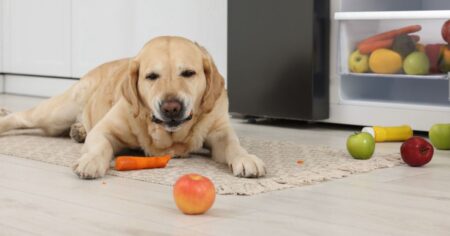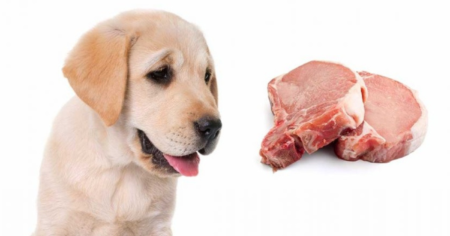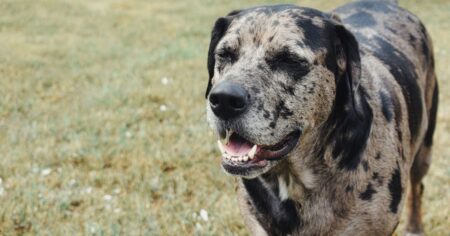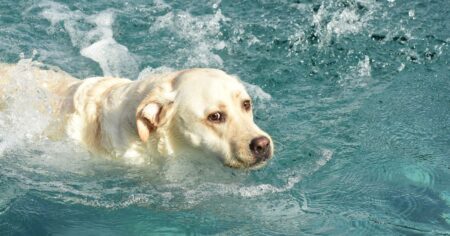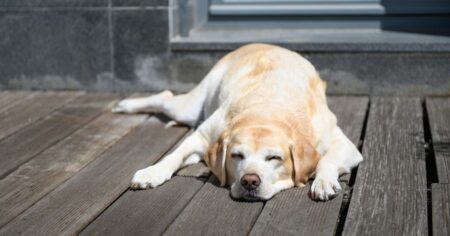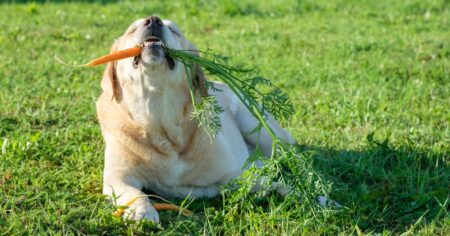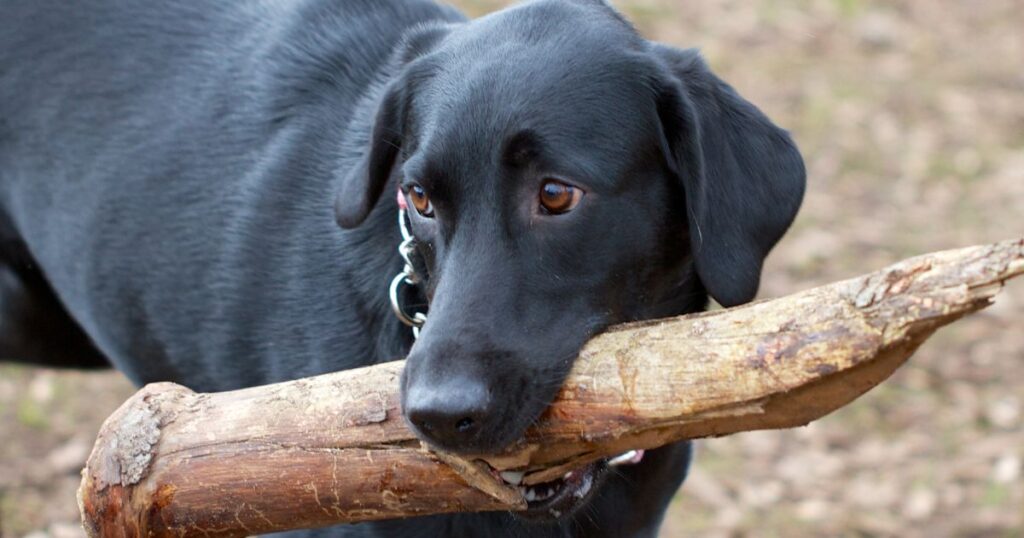
Labrador puppies are among the most popular family pets, known for their friendly nature and intelligence. However, along with their delightful personality comes an issue many new puppy owners may find challenging – puppy biting. It’s crucial for potential Labrador owners to understand that biting is a natural behavior in puppies and should not be mistaken for aggression or negative conduct.
During their early stages of development, Labrador puppies tend to explore their environment using their mouths. They might chew on objects and bite or nip to play, interact, and express love towards their owners. Although this behavior might seem harmless at first, it is essential to teach your Labrador puppy not to bite or nip at humans or other animals to avoid injuries and undesired behaviors later in life.
To address this issue, it’s helpful to know the proper techniques for discouraging biting and promoting good behavior. By providing positive reinforcement and early training, pet owners can develop a strong bond with their Labrador puppies and prevent biting from getting out of control.
When Does Biting Start?
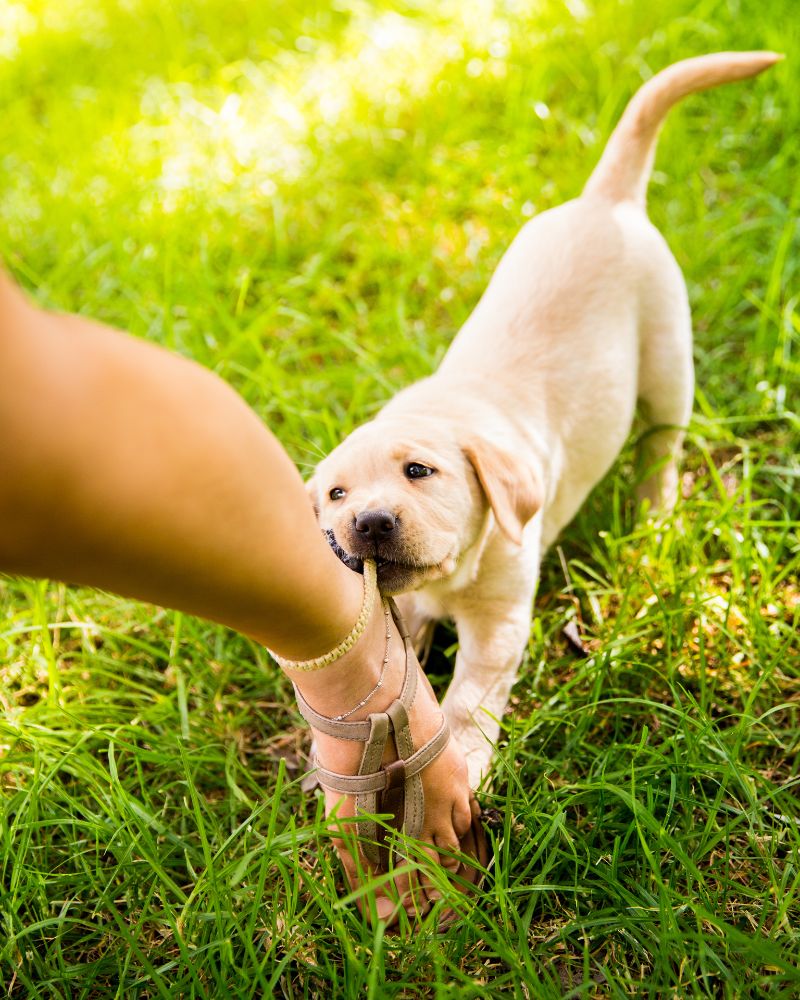
Labrador puppies, like all puppies, begin biting at a young age. This behavior starts as early as a few weeks old when puppies begin exploring the world around them. By using their mouths, they can interact with their environment and learn about different textures and tastes.
The biting and gnawing that puppies engage in during this time also help with the teething process. Labrador puppies generally develop their adult teeth between 12 and 16 weeks of age, and this may cause some discomfort in their gums [(source)]. This can lead to an increase in biting as puppies attempt to soothe their gums during this teething period.
To manage puppy biting and help them develop good habits, it’s important to introduce bite inhibition training early on. This can be done through various methods, such as redirecting their biting to appropriate chew toys and rewarding gentle behavior [(source)].
Remember, puppy biting is a natural part of their growth and development. As Labrador puppies grow and their adult teeth come in, their biting behavior should decrease. With a combination of patience, guidance, and appropriate chew toys to help with teething, you can help your Labrador puppy learn better manners and grow into a well-behaved adult dog.
Do All Labradors Bite?
Labrador puppies, like all puppies, tend to go through a biting phase. However, this doesn’t mean that all Labradors will grow up to be aggressive or continue biting behaviors. In most cases, biting and nipping are part of a puppy’s natural exploration and playfulness. With proper training and socialization, a Labrador puppy will learn to have appropriate bite inhibition and reduce biting as it matures.
My Puppy Bites A Lot
If your Labrador puppy seems to bite a lot, it could be due to several factors, such as playfulness, fear, or even teething. Puppies have a strong instinct to chew and explore with their mouths, and this behavior can lead to biting at objects and people.
When puppies bite during play, it helps them learn their boundaries and develop bite inhibition. They are essentially figuring out how hard they can bite before it becomes painful for the recipient. This behavior is normal but should be addressed and discouraged in young puppies to prevent it from becoming a problem when they grow older. Methods to help stop puppy biting include correcting them with a gentle “no” and redirecting their attention to appropriate toys.
Fear or stress can also lead to biting in puppies. When a puppy feels threatened, it may react by biting as a defense mechanism. Addressing the source of their fear and providing a calm, supportive environment can help them feel more secure and reduce biting behaviors.
Teething can play a role in increased biting as well. As the puppy’s adult teeth begin to grow in, they may experience discomfort and have an increased desire to chew on objects to alleviate the pain. Providing appropriate chew toys can help satisfy their need to chew and reduce any biting directed towards people.
To sum it up, it’s important to remember that Labrador puppies, like all puppies, may go through a biting phase. Recognizing the underlying reasons for their biting behavior and addressing these issues with proper training and patience will help guide them towards becoming well-behaved adult dogs.
My Puppy Is Biting My Children!
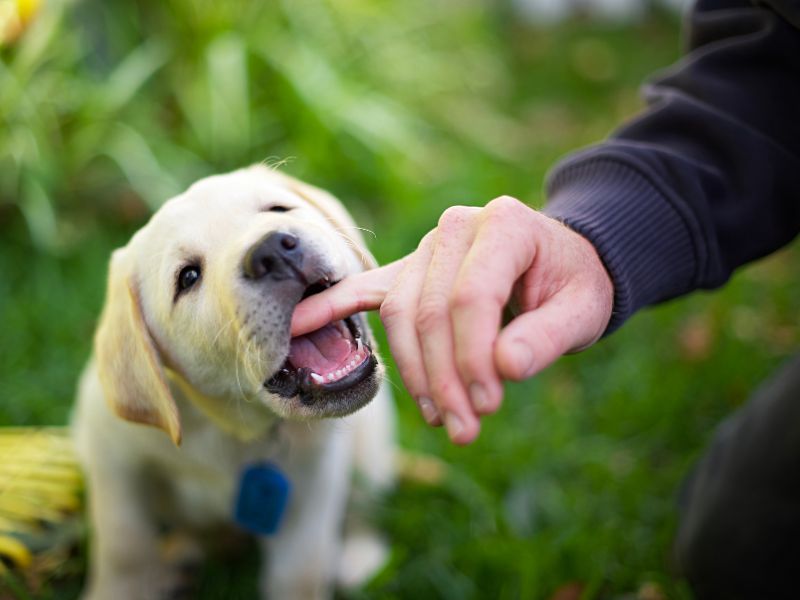
Labrador puppies are known for their playful and sometimes mouthy behavior, but it can become a concern when they start biting children. In this section, we will discuss why puppies bite children and what can be done to address this issue.
Why Do Puppies Bite Children?
Puppies tend to bite for several reasons, such as teething, playfulness, and fear. It is important to understand the cause of the biting behavior to address it effectively.
Teething: Labrador puppies go through a teething phase, which can cause them to bite in an attempt to alleviate the discomfort. This phase typically begins around 9 weeks old and continues until they have their full set of adult teeth at about 7 months old1.
Playfulness: Play-biting is a natural part of a puppy’s development, as they learn how to socialize and interact with their environment. However, when puppies become overexcited, their play-biting can escalate and become harder and more frequent2.
Fear and Insecurity: In some cases, puppies may bite children out of fear or insecurity. If they perceive a child as a threat or feel overwhelmed, they may resort to biting as a means of self-defense3.
To address the issue of a Labrador puppy biting children, consider the following steps:
- Redirect the biting: Provide appropriate chew toys for your puppy to redirect their biting behavior towards objects instead of people4.
- Calm your puppy: Keep your puppy calm and avoid engaging in rough play, as this can trigger more biting2.
- Teach bite inhibition: If your puppy bites during play, immediately stop playing and ignore them for a brief period. This teaches them that biting leads to an interruption in playtime4.
- Educate children: Explain to your children how to interact with the puppy gently and teach them to recognize when the puppy is overexcited or scared3.
By understanding the underlying reasons for a Labrador puppy’s biting behavior and taking appropriate measures, it is possible to curb this undesirable behavior and ensure harmony between your puppy and your children.
Why Do Labrador Puppies Bite So Much?
Labrador puppies are known for their playful and curious nature, which often involves using their mouths to explore and gather information. This seemingly increased biting may seem alarming, but it is a normal part of a puppy’s development.
One reason Lab puppies bite so much is teething. When puppies are growing their adult teeth, they experience discomfort in their gums, which prompts them to chew and bite source. Chewing helps soothe the ache along their gums, making it a natural way to alleviate teething pain.
In addition to teething, Lab puppies bite to engage in play. They learn valuable social skills through play, such as communication and establishing boundaries with their littermates. Play-biting helps them learn how to control their bite strength and mouth pressure, developing a vital skill called bite inhibition source.
Lastly, Lab puppies may also bite out of fear or aggression when they feel threatened or unsafe. These instances are less common compared to playful or teething-related biting. However, it’s crucial to address and correct this type of behavior if it occurs, as it can escalate into a more severe problem if left unaddressed.
Understanding the reasons behind your Labrador puppy’s biting is the first step in addressing and managing this normal developmental behavior effectively. With proper guidance, patience, and training, your puppy will learn appropriate ways to explore and interact without resorting to excessive biting.
My Puppy Bites So Hard!
Labrador puppies are known to explore the world through their mouths, and biting is a natural behavior for them. However, it is important to teach your puppy bite inhibition, which means learning to reduce the force or pressure applied with their jaws. As a rough guide, aim to eliminate all painful biting by around three months of age1.
When a Labrador puppy bites really hard, immediate action should be taken. Don’t wait to see if they do it again. The best response is to stand up, move away from the puppy and completely withdraw attention2. Making a squeal sound may also work well with some puppies, as it replicates the sound their littermates would make if bitten too hard2.
It is essential to understand the difference between playful biting and aggression. An aggressive puppy will exhibit a stiff or frozen body, facial tension, and may snarl or growl3. If your puppy shows aggressive behavior, it is crucial to consult a veterinarian to rule out any underlying pain or health issues3.
Here are some tips to help stop a Labrador puppy from biting too hard:
- Provide appropriate chew toys for them to gnaw on
- Redirect their biting behavior onto a toy or chew treat
- Use consistent verbal cues such as “no bite” or “gentle”
- Socialize your puppy with other dogs to teach them natural bite inhibition
- Reward and praise gentle behavior during playtime
Remember not to yell at or physically punish your puppy, as this can increase the risk of aggression4. Stick to positive reinforcement and consistency to foster a good relationship and teach your Labrador puppy to be a gentle playmate.
Is My Puppy Aggressive?
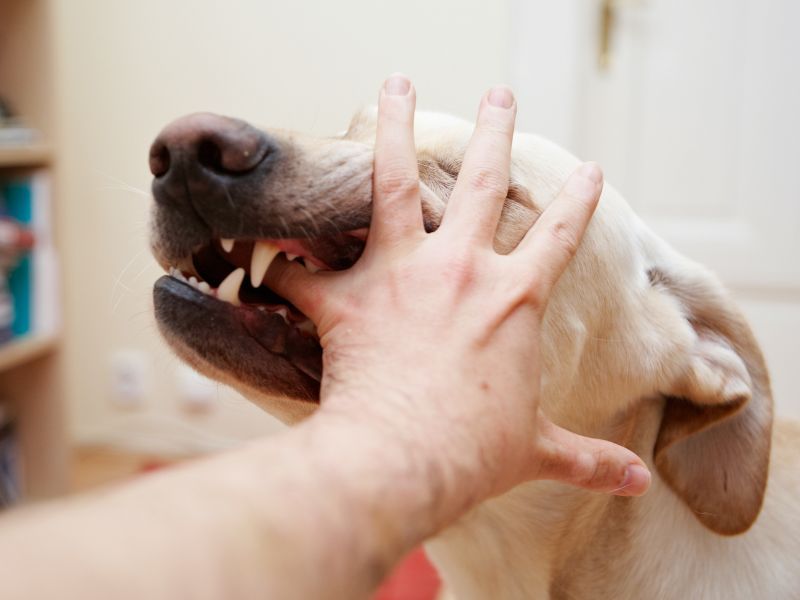
It’s natural for new Labrador puppy owners to worry if their pet is showing signs of aggression. Some common behaviors that may cause concern include biting, nipping, stiff posture, growling, snarling, lip curling, and resource guarding. However, not all of these behaviors are indicators of aggression; some are simply part of normal puppy play 1.
Labrador puppies, like most breeds, tend to bite and growl as they’re playing. This behavior is not a sign of aggression and is a normal part of their developmental process. Biting is a phase that pups typically go through before learning proper social skills 2. As long as the biting doesn’t break the skin or cause bleeding, it’s unlikely to be due to dominance or aggression 3.
To determine if your Labrador puppy is genuinely aggressive or just experiencing normal puppy behavior, watch for the following warning signs:
- Snarling: Observe if the puppy’s snarling is accompanied by other aggressive behaviors or if it’s just a part of play.
- Lunging: Puppies might lunge during play, but it becomes worrisome when they lunge at other animals or people aggressively.
- Biting forcefully: Puppies bite during play, but forceful bites indicate a potential problem.
In case you notice these aggressive behaviors in your Labrador puppy, it’s crucial to address the issue immediately. Aggressive behavior is easier to correct when the puppy is young and still developing, so timely intervention is key 4.
To tackle puppy aggression, it’s advisable to:
- Provide proper training and socialization.
- Use positive reinforcement techniques.
- Consult with a professional dog trainer or behaviorist if needed.
Remember, aggressive behavior in Labradors won’t resolve on its own, and it’s important to take action to ensure your puppy grows up to be a well-behaved and happy adult dog.
My Puppy Is Growling At Me!
It’s normal for labrador puppies to go through a biting and growling phase. Puppy growling can be alarming, but it is essential to understand that it is usually not a sign of aggression. Instead, it might be a way for the puppy to express discomfort or to engage in playful communication.
When a labrador puppy is growling or biting, it is crucial not to punish them. Punishment can do more harm than good and may reinforce negative behaviors. Instead, focus on redirection and training techniques to minimize this behavior (source).
To address growling effectively, consider these strategies:
- Socialization: Expose the puppy to a variety of people, animals, environments, and situations. This exposure helps them learn how to behave appropriately and reduces anxiety in unfamiliar situations.
- Positive reinforcement: Reward your puppy when they display desired behaviors, such as sitting or staying calm when meeting new people. This reinforcement encourages them to repeat these positive actions instead of resorting to growling.
- Redirection: If the puppy begins to growl or bite, redirect their attention with a toy or activity they enjoy. This tactic helps teach them that there are more appropriate ways to express themselves.
- Providing clear boundaries: Establish and maintain a consistent set of rules and boundaries for the puppy to follow. Consistency helps the puppy understand expectations and develop a sense of security.
Remember that patience and persistence are key to addressing growling behaviors in labrador puppies. Most puppies will outgrow biting and nipping around six months of age, but training is vital to ensure the development of proper social skills (source).
Normal Puppy Play Behavior
Labrador puppies are known for their playful and energetic nature. One of the most common behaviors observed in these puppies is mouthing and biting, which is considered a normal part of their growth and development. While playing, Labrador puppies may display a variety of behaviors that may seem aggressive but are actually typical signs of healthy play.
One key indicator of normal play behavior is the “play bow.” This is when a puppy lowers its front end while keeping its back end in the air, often repeatedly slapping their front legs down on the ground. This action is a clear signal that the puppy is interested in playing and having fun with its playmate, whether human or another dog source.
Another sign of healthy play is when puppies engage in open-mouthed play, which is characterized by a big, silly grin. This type of mouth posture is non-threatening and shows that the puppy is relaxed and enjoying the interaction. When the open-mouthed play gets rough, teeth and gums are inevitably involved, but there shouldn’t be any signs of fear or distress from the participants.
Teething is also a significant factor that contributes to the biting behavior in Labrador puppies. This process generally starts around 9 weeks of age and can last up to 7 months when they get their full set of adult teeth source. During this period, puppies tend to bite more frequently as a means of alleviating the discomfort associated with teething.
It’s important to note that while this biting behavior might seem alarming, it is a normal part of a Labrador puppy’s development. Teaching them to inhibit their biting and mouthing is crucial to ensure they grow into well-behaved, sociable adult dogs.
Training a puppy to control or stop their biting can take time and patience, but it is important to focus on stopping painful bites first and then working on putting a stop to mouthing entirely source. Remember that consistency and positive reinforcement are key in helping your Labrador puppy learn appropriate play behavior.
When Do Puppies Stop Biting?
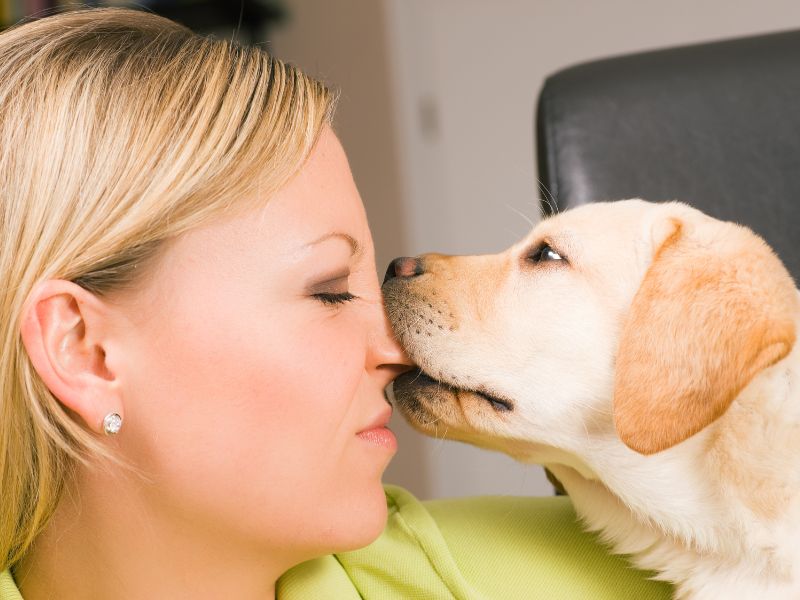
Labrador puppies typically begin to stop biting around the age of 7 to 8 months. This is generally when they have a full set of adult teeth, and the biting process occurs naturally without any specific “no-bite” training needed ^1. However, in some cases, training becomes necessary to curb biting behavior, or it could lead to the puppy becoming an uncontrollable biter and dangerous dog as an adult.
It’s essential to understand that biting is a natural behavior for puppies as they explore their environment, play, and interact with their littermates. This behavior helps them learn bite inhibition, which is crucial for them to become well-socialized and safe adult dogs ^2.
To help decrease biting behavior, owners can teach bite inhibition through various techniques, such as:
- Redirecting their puppy to an appropriate toy when they attempt to bite
- Letting out a loud yelp or squeal, similar to how their littermates would respond, and withdrawing attention for a brief period ^3
- Utilizing positive reinforcement when they engage with toys or chew on appropriate items
Keep in mind that patience and consistency are key during this teaching period, as different puppies may take longer or respond to different methods when it comes to stopping biting behavior ^4. Many puppies might also have biting episodes due to pent-up energy – so be sure to provide them with ample opportunities for exercise and mental stimulation.
Things That Make Biting Worse
Labrador puppies tend to bite more when they are excited, seeking attention, or have poor bite inhibition. In this section, we will explore these factors and how they contribute to a puppy’s biting behavior.
Let’s Take Each of These in Turn:
Rewarding Puppies with Attention
Labrador puppies may bite more when they receive attention for doing so. This is because they start to associate biting with getting their owner’s attention. It is important for owners to avoid inadvertently rewarding their puppies for biting, even when the intention is to reprimand them. Instead, owners should redirect their Labrador’s attention with dog-safe rubber chews or teething toys, preventing the biting behavior from being reinforced.
Poor Bite Inhibition
Bite inhibition is a crucial skill that puppies need to learn in order to control the pressure they apply when using their teeth. Puppies usually learn bite inhibition while playing with their siblings, as they understand that biting too hard will result in the play coming to an end. In the case of Labrador puppies, poor bite inhibition may lead to more frequent and harder bites that become increasingly difficult to control. One way of teaching bite inhibition is by using a high-pitched yelp to signal that their bite is causing harm, thus prompting the puppy to eventually soften its bite or stop altogether.
What Is Bite Inhibition?
Bite inhibition is a crucial skill that all puppies, especially Labrador puppies, should learn at a young age. It refers to a puppy’s ability to control the strength of their bite, preventing the infliction of harm to people or other animals during play, exploration, or in response to fear or pain1.
Fur Versus Skin
Dogs have a natural understanding of bite inhibition when playing with other puppies or adult dogs. During their interactions, they quickly learn that biting too hard can lead to retaliation or the halting of playtime. This helps them develop a sense of how much pressure is acceptable when play-biting2.
However, puppies need to learn that human skin is more delicate than the fur-covered bodies of other dogs. It’s essential to teach them to adjust their bite force accordingly to avoid potential injuries.
To achieve this, allow puppies to engage in supervised play sessions with people, in which they can experiment with different levels of bite pressure. During these sessions:
- Redirect biting to a toy if the puppy bites too hard
- Use positive reinforcement for gentle play
- Immediately stop the play if the puppy bites with excessive force, signaling to them that their behavior ended the fun
Through this process, Labrador puppies will begin to understand that humans have a different sensitivity threshold, and they will gradually develop appropriate bite inhibition skills.
What About Puppy Teething?
Labrador puppies experience teething as they grow, which can cause them to bite more frequently. Teething typically begins around 3 to 4 months of age, and this is when puppies start exploring their surroundings with their mouths1. They will naturally want to bite and chew on various objects to relieve the discomfort caused by their new teeth emerging.
During the teething process, you may observe puppies drooling, or even finding little spots of blood on their toys2. This is normal, but if you notice anything unusual, don’t hesitate to consult with your veterinarian. Puppies’ deciduous, or baby teeth, usually erupt by the time they are 6 weeks old3. At around 12 weeks, these baby teeth begin to fall out, and permanent adult teeth start to emerge.
As the permanent teeth develop and the baby teeth fall out, your Labrador puppy may experience a peak in biting behavior. However, most puppies will have their full set of adult teeth by the time they reach 7 months of age4. By this time, their biting behavior should decrease significantly.
To help your Labrador puppy cope with teething, offer them teething toys specifically designed for puppies. These toys are made of softer plastic, which won’t harm their baby or emerging adult teeth5. Ensure you monitor your puppy during playtime to prevent them from chewing off small pieces and potentially swallowing them.
Remember, teething is a natural part of a Labrador puppy’s development, and patience is essential during this stage. By providing them with appropriate toys and understanding their needs, you’ll ensure a smoother transition through the teething process.
Get Pippa’s Training Tips!
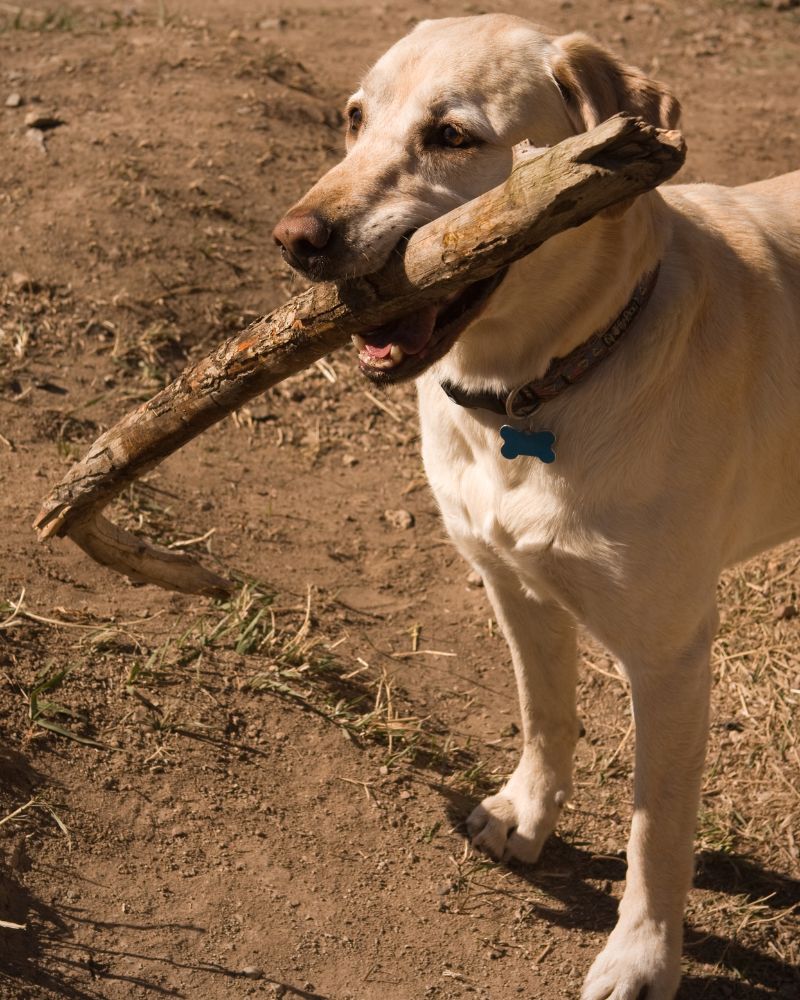
Labrador puppies are known for their playful and curious nature, which often leads to nipping and biting incidents. To help your Lab puppy grow into a well-mannered adult dog, it’s essential to establish bite inhibition early on in their life. Pippa, a renowned dog trainer, offers valuable tips to address this common puppy behavior.
First and foremost, Pippa suggests understanding that biting and nipping is a normal part of a puppy’s development. They use their mouth to explore their surroundings and learn about their environment. So, it’s crucial to be patient and consistent throughout the training process.
One approach Pippa recommends is to emulate a puppy’s littermates during playtime. If your puppy bites down too hard, emit a high-pitched yelp or shout “Ouch!” to indicate that the force is not acceptable. When they release their grip, avoid jerking your hand away, because this could encourage a chase response source.
Here are more of Pippa’s training tips to help your Lab puppy stop biting:
- Redirect the biting: Offer your puppy a chew toy or rawhide stick as an appropriate alternative to keep them engaged and satisfied source.
- Positive reinforcement: Reward your puppy with praise or treats when they display desirable behavior, such as avoiding biting when you engage with them source.
- Time-outs: If your puppy persists in biting, separate yourself from them for a short period, allowing them to calm down and understand that their behavior has led to a loss of attention.
- Socialization: Expose your Lab puppy to various people, animals, and environments to improve their bite inhibition and overall behavior.
Keep in mind that during the teething process, your Lab puppy may become more inclined to bite due to discomfort. Providing them with cold chew toys can help alleviate their gums’ soreness and redirect the biting behavior. Always remain patient and consistent in your training methods, and you’ll see progress in your puppy’s bite inhibition over time.
Biting At 9 Weeks Or 10 Weeks
Labrador puppies at 9 or 10 weeks of age are prone to nipping and biting. This behavior can be quite normal and is often due to their teething phase. Furthermore, it is a way for them to explore their environment and establish boundaries with other puppies or humans.
To prevent the puppy from biting, you can offer them a variety of engaging chew toys or treats, like carrots or yakkers (source). These items not only help to satisfy their chewing urges but also redirect their energy away from biting people. Remember to always praise and reward your puppy when they choose to chew on these toys instead.
Another effective technique is to use verbal cues, such as a sharp yelp, to communicate that the bite was too hard. Next, move away from the puppy to give them a chance to understand the message. Additionally, if the puppy continues to chase and bite, you can temporarily leave the room and close the door as a deterrent (source).
Socializing your Labrador puppy from a young age is crucial to preventing aggressive behavior like biting (source). It teaches them how to interact and behave around other animals and people. The more they are exposed to different environments and situations, the better they become at adjusting their behavior.
In summary, dealing with biting in 9- or 10-week-old Labrador puppies involves patience, redirection, and consistent communication. With proper socialization and training, they will outgrow this phase and become well-mannered, beloved companions.
How To Train A Puppy Not To Bite
Training a Labrador puppy not to bite takes patience and consistency. Puppies explore the world with their mouths, but it’s important to teach them that biting humans and other animals is not acceptable. Here are some practical tips on how to train your Lab puppy not to bite.
Firstly, it’s essential to provide appropriate chew toys for the puppy. Distracting the puppy with durable chew toys can help direct their biting habits to acceptable objects and save your hands from sharp teeth. WagWalking suggests using teething toys that are safe and entertaining for the puppy to chew on.
Another useful technique is to use command training. According to OxfordPets, commands such as ‘Stop’, ‘No’, ‘Leave’, and ‘Get Back’ can be effective in preventing puppies from biting. Be sure to use a firm but calm tone of voice and repeat the command until the puppy stops biting.
In addition, maintaining a calm environment is crucial, as over-excited puppies tend to bite even harder and more frequently. The Labrador Site advises avoiding rough play if the puppy is an enthusiastic biter. Instead, opt for gentle play sessions to help keep the puppy’s excitement levels in check.
If the puppy continues to bite, it might be necessary to give them a timeout. AKC recommends gently placing the puppy in their crate to provide a chance for them to calm down. However, avoid using the crate as punishment, as this can create negative associations for the puppy.
Using a high-pitched yelp can also signal to the puppy that they are hurting you. When the puppy bites, let out a yelp and immediately stop playing, as suggested by OxfordPets. This mimics how another dog would react if bitten too hard during play, helping the puppy learn about bite inhibition.
Remember, consistency is key when training a puppy not to bite. It may take some time, but eventually, your Labrador puppy will understand the boundaries and develop good behavior.
Stage One: Separate and Supervise
Puppies and Children – Do’s and Don’ts
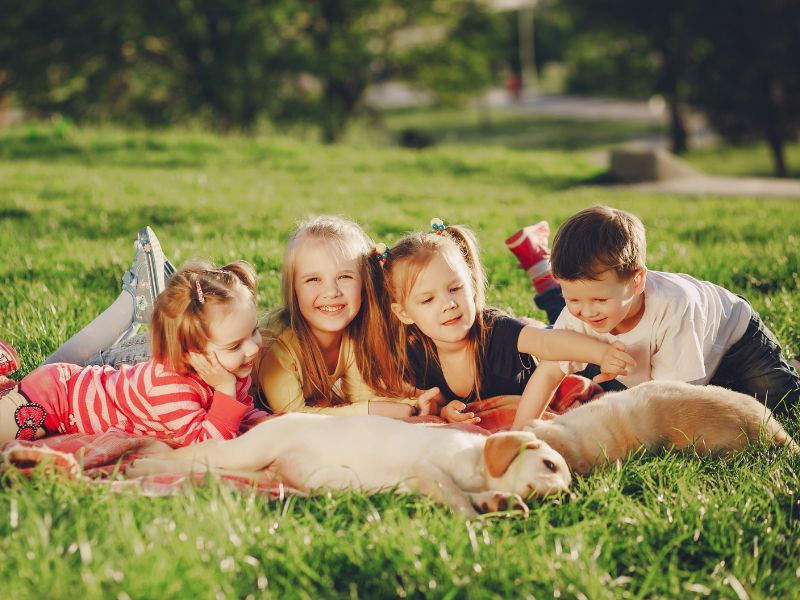
It is important to keep a close eye on interactions between labrador puppies and young children. Establishing barriers such as baby gates and cozy dog crates can help keep puppies and little kids apart when supervision isn’t feasible1.
Make sure children partake in calm play, as overexcited puppies tend to bite harder and more frequently1. Teach children to avoid pulling the puppy’s tail or fur to prevent provoking unwanted biting behavior.
Playful Visitors
When your Labrador puppy meets new visitors, ensure a calm and controlled environment. Encourage visitors to interact gently with the puppy, avoiding rough play or intense activity. Provide chew toys or distractions for the puppy to minimize the chances of biting people.
Additionally, informing visitors of the puppy’s training progress and asking them to follow your training techniques can help maintain consistency in the puppy’s learning process regarding biting behavior.
Saving Your Sanity
A combination of exercise, training, redirection, and positive affirmation is crucial to curbing unwanted biting in labrador puppies2. Regular exercise benefits both the puppy’s physical and mental well-being, reducing their propensity to bite.
Training methods can include redirecting the puppy’s biting to appropriate chew toys or making a yelp sound to communicate that biting is not an acceptable behavior3. Consistency is key, so consistently applying these methods will likely yield better results.
Enjoying Your Puppy
It’s essential to understand that labrador puppies go through a natural biting phase due to their instinctive actions such as exploring, play fighting, and teething4. With proper training and persistence, most puppies outgrow excessive biting and nipping by approximately six months old.
Maintain a loving and patient attitude, providing gentle guidance and reassurance throughout the training process. This way, both you and your labrador puppy can enjoy each other’s company and foster a positive, lifelong bond.
Stage Two: Don’t Make Things Worse
It’s essential for Labrador puppy owners to understand that biting is a natural behavior for puppies, especially during the teething process which starts around 3-4 months old and ends by 7 months old when they have their full set of adult teeth 1. In this stage, it’s crucial not to exacerbate the situation by accidentally encouraging undesirable biting behaviors.
Firstly, owners must remain patient and calm when dealing with their Labrador puppies’ biting habits. Getting frustrated, angry, or reacting harshly may confuse the puppy or potentially worsen the situation. Remember that this is a temporary phase, and with proper guidance, your puppy will grow out of biting.
Secondly, avoid encouraging biting during playtime by using appropriate toys or chew items for your Labrador puppy to chew on2. Engaging in rough play or using your hands as toys can inadvertently promote biting behavior. Instead, redirect your puppy’s attention to appropriate chew toys that will satisfy their need to chew 2.
Lastly, being consistent and setting boundaries for your Labrador puppy are crucial in preventing biting from becoming a bad habit. If you notice your puppy biting or nipping, correct them with a clear and gentle “no” and redirect their attention to an acceptable activity 2. Providing unwanted attention or accidentally rewarding their biting behavior may send mixed signals, making it harder for the puppy to learn when biting is inappropriate.
By following these guidelines during the teething phase, Labrador puppy owners can prevent their puppies’ biting habits from developing into a problematic behavior. Remember that patience, consistency, and understanding are essential factors in helping your puppy grow into a well-behaved adult dog.
Stage Three: Teach Your Puppy Not To Hurt You
What to Do When Your Puppy Bites
During the third stage, you should focus on teaching your Labrador puppy not to apply pressure when mouthing or biting. If your puppy bites too hard, immediately stop playing and ignore them for a moment. This teaches them that biting too hard means the fun and attention ends. Gradually, they should learn to control the intensity of their bites and to only gently mouth your hands by the time they are four to five months old1.
What About Squealing?
Some trainers suggest making a high-pitched yelp or squeal when your puppy bites too hard. This is meant to mimic the sound their littermates make when bitten, signaling to the puppy that the biting is painful. However, be cautious with this approach, as it may excite some puppies even more and lead to increased biting2.
What About Punishment?
Punishing your puppy for biting is generally not recommended, as it can increase fear and anxiety, leading to more intense biting behavior. Instead, focus on positive reinforcement and consistency in setting boundaries3.
What If You Need to Move a Biting Puppy?
If you need to move your puppy and they are biting, try distracting them with a toy or treat. This can help redirect their attention and allow you to safely move them without encouraging biting behavior4.
How To Stop Your Puppy Biting Hands
Distracting Your Puppy
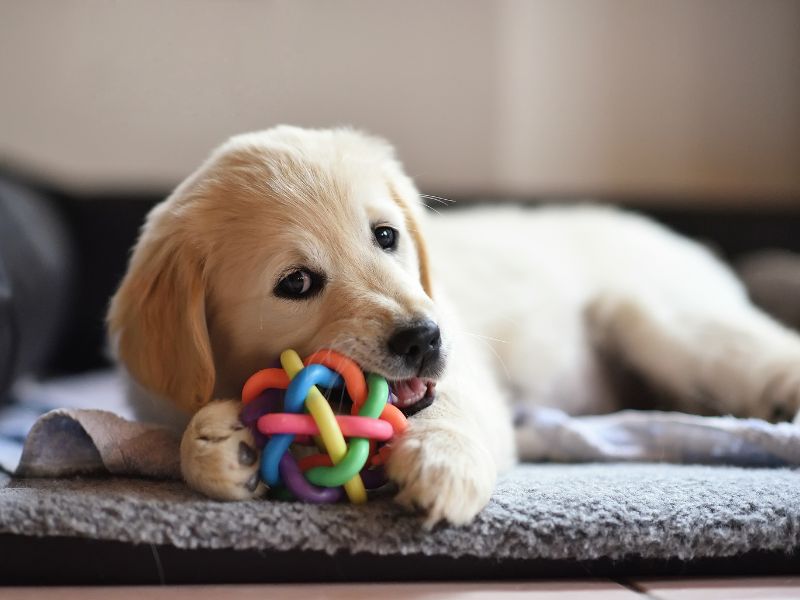
One effective method to stop your Labrador puppy from biting hands is by offering them distractions. Provide your puppy with appropriate chew toys that can redirect their attention and satisfy their natural desire to bite and chew. This helps in teaching your puppy that biting toys is acceptable, while biting hands is not.
Make sure to praise and reward your puppy when they opt for the toy instead of your hand. In the long run, this positive reinforcement will help discourage them from biting and develop healthy habits.
Using a Houseline
Utilizing a houseline is another helpful technique in dealing with Labrador puppies who tend to bite. A houseline is a light, long leash that stays attached to your puppy while they are indoors. It allows you to intervene and manage your puppy’s behavior with minimal fuss.
When your puppy begins to bite your hand or display unwanted behavior, gently tug on the houseline and redirect your puppy’s attention to a more appropriate activity or toy. By consistently using the houseline, your puppy will learn that biting hands will not get them the attention and play they desire.
It’s essential to remain patient and consistent with these methods. With time, your Labrador puppy will start to understand boundaries and develop bite inhibition, leading to a well-mannered and happy companion.
Stage Four: Train Your Puppy Not To Bite
In this stage, the focus is on training a Labrador puppy not to bite using a simple yet effective training exercise. The goal here is to teach your puppy that biting means “game over” and encourages them to inhibit their mouthing behavior.
Here’s How The Training Exercise Goes:
- Hold a small, tasty treat in your fist and offer it to your puppy. Their natural reaction will likely be to sniff, paw, and nibble at your hand to get the treat, but you must ignore their efforts and maintain a blank facial expression.
- Wait for the puppy to stop biting, and the moment they do, give them verbal praise such as “good” or “yes” and immediately reward them with the treat. This reinforces the positive behavior of not biting.
- Repeat this training exercise frequently throughout the day, gradually increasing the duration your puppy needs to refrain from biting before receiving the treat. This helps them develop self-control and understand that biting is not rewarded.
What Do I Do If He Mouths At Me?
If your puppy continues to mouth at you during the training exercise or in other situations, follow these steps:
- Cease any form of interaction with the puppy immediately. This includes stopping the training exercise, removing your hand, and avoiding eye contact.
- Give your puppy a safe and appropriate chew toy or an alternative form of stimulation, such as a puzzle toy filled with treats, to redirect their attention away from mouthing at you.
- Resume the training exercise once the puppy has calmed down and is no longer mouthing at you.
Remember to be patient and consistent with the training process, as it may take time for your Labrador puppy to fully understand and inhibit their biting behavior.
Stage Five: Playing Safely
Labrador puppies love to play, but sometimes their biting can be a cause for concern. It’s important to teach your puppy how to play safely and adopt healthy habits from an early age.
Safe Puppy Play
One of the most effective ways to promote safe play with your Labrador puppy is by encouraging them to engage in activities that don’t involve biting. Here are some ideas to ensure you have a good time with your pup while preventing excessive nipping:
- Introduce toys and games: Offer your puppy a variety of toys to chew on, such as rubber chew toys, plush toys, and tug toys. Engaging them in games like fetch, where they can chase after a ball or toy, encourages them to focus their energy on the activity rather than on nipping at your hands or feet.
- Teach bite inhibition: According to The Labrador Site, puppies learn to reduce the force of their biting during play by practicing with their siblings. As a pet owner, gently discouraging your pup when they bite too hard and rewarding them with praise or treats when they’re gentle can help to establish proper bite inhibition. The AKC offers more detailed guidance on this technique.
- Establish boundaries: Create designated areas for play, and set clear boundaries and rules for your puppy. Keep non-toy items like shoes and household objects out of reach to discourage your puppy from developing bad habits. Practicing obedience training can also help establish your authority and set expectations for your puppy’s behavior.
- Use redirection: When your Labrador puppy starts nipping or getting overly excited during play, redirect their attention to a toy or engage in a different activity. This teaches them to associate proper playtime behavior with positive outcomes.
- Positive reinforcement: Reward your puppy with praise, treats, and affection when they play safely and appropriately. This helps to reinforce proper behavior and will encourage them to continue playing gently.
With these tips and some patience, your Labrador puppy will learn how to play safely and enjoy their interactions with you and others without resorting to excessive biting. Remember that every puppy is different, and finding the right balance of techniques will help your pup grow into a well-mannered and playful adult dog.
When Do Puppies Stop Biting?
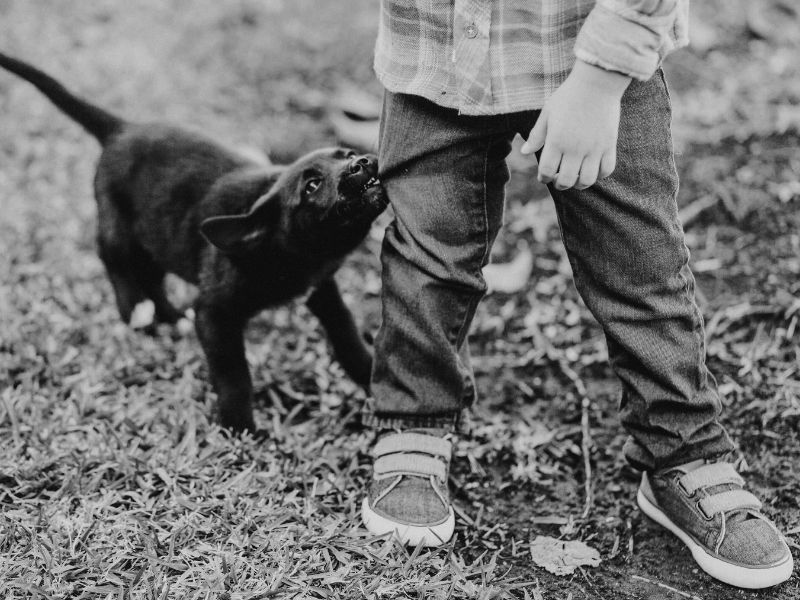
Labrador puppies, like all puppies, experience a teething phase as they grow. This generally starts when they are around 3-4 months old and lasts until they have their full set of adult teeth, which happens around 7 months of age1. During this time, puppies will naturally bite due to the discomfort of teething, but also as a way to engage in play and learn about the world around them2.
It’s essential to understand that biting is a part of normal dog behavior for young puppies. They are trying to engage with their environment and interact with the people and objects they encounter3. As they grow older and mature, their biting tendencies will naturally decrease, and they will engage in other, more appropriate behaviors instead.
For Labrador puppies, the biting phase might stop or significantly decrease when they complete teething, but this is not set in stone. A Labrador might stop displaying this behavior upon reaching maturity, which occurs between 2 and 4 years of age4. To help your puppy stop biting during the teething phase, redirect their biting behavior toward appropriate objects, such as chew toys, and provide them with positive reinforcement when they engage in appropriate activities.
In the meantime, it is crucial to work on training your puppy to curb their biting behavior. Try techniques like making a loud noise to startle your puppy to stop biting or immediately withdrawing your attention if they bite2. Consistent training and redirection, combined with plenty of exercise and mental stimulation, will help your Labrador puppy develop good habits and eventually stop biting altogether5.

